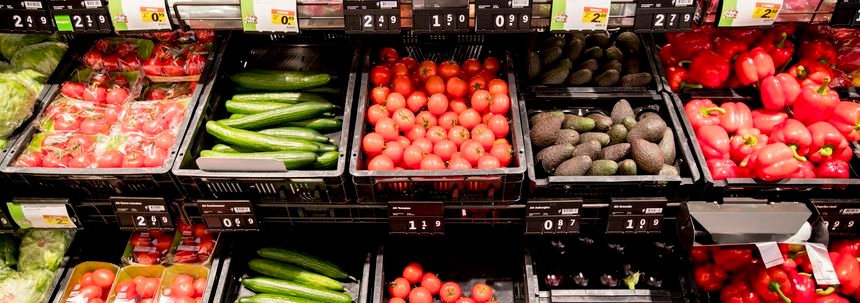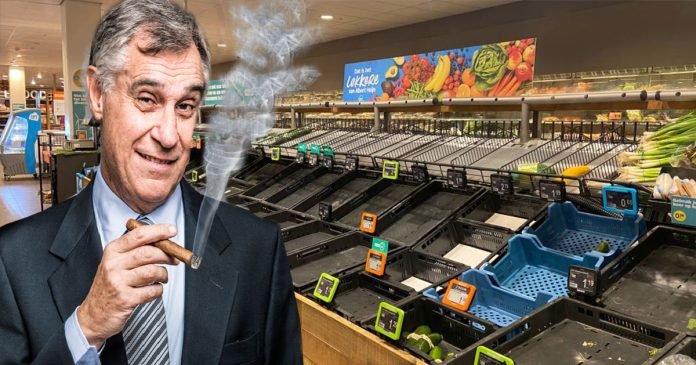Why is there a shortage of tomatoes and other fruit and vegetables in the EU and UK?
It doesn’t take much for the usual ‘Remain Hysterians’ to pump out fake news while jumping on the bandwagon if they think they can point a finger at Brexit. However, in doing so it always amazes me how little European news the Europhiles actually read…
Recent days have shown some supermarket shelves low on fresh produce, particularly Tomatoes. This has led to a social media campaign by die-hard Remainers/Rejoiners to spread fake news claiming the shortages are down to Brexit. Apart from the disinformation, all that does is let both the Energy companies and the weak government off the hook.
It took very little research to understand this week’s crisis is due to the exploitation by energy companies who are intent on not only raking billions in profit but destabilising the entire European economy.
The knock-on effects have seen inflation at its highest in the last 40 years and a real cost of living crisis hitting everyone except the oligarchy hard.
World Market: tomato…

The real reasons behind the shortages become apparent when you see the bigger picture.
At the start of the year, the global tomato market is facing the same problems as in 2022, topped by the increase in energy costs which weigh on producers’ margins. This is particularly evident in the markets of Northern Europe, where supplies have fallen considerably compared to last year. Many growers choose not to turn on the heating or lights needed for greenhouse winter crops.
The EU preempted the knock-on effects that high energy prices would create but still witnessed food shortages as a direct result of high energy prices.
Last September, Italians in Rome, Milan and Naples burned their energy bills in a coordinated protest against soaring prices. In October, thousands took to French streets to decry government inaction over the high cost of living. And in November, Spanish workers rallied for higher wages, chanting “salary or conflict.”
Researchers have defined an unprecedented global wave of more than 12,500 protests across 148 countries over food, fuel and cost of living increases in 2022. And the largest were in Western Europe.
Prices of food and especially energy were pushed up first by the COVID-19 pandemic and then by the extortion by energy companies. And, while food and energy shortages have hit the Global South hardest, the crisis of affordability is sending increasing numbers of people onto the streets in the richer countries of the Northern Hemisphere.
The reason why we are seeing empty supermarket shelves! time for #homegrownfairtrade @defrauk@10downingstreet #food #tomatoes #farming #energycrisis #supermarkets #agri #agriculture #foodshortages #nfu more info Notdue to #Brexit https://t.co/lUmuZGD1An pic.twitter.com/lWR41hJNNR
— Labour Heartlands (@Labourheartland) February 22, 2023
The Times forewarned of coming food shortages as winter approached. Pekka Pesonen, Copa-Cogeca Secretary-General representing EU farmers, said this week that the knock-on effects of high bills are more severe than expected. Prices for inputs like fertilizer and animal feed had skyrocketed, while rising cooling, heating and transport costs discouraged farmers from growing.
Tony Montalbano’s family has been growing vegetables in the south-east of England for decades, uninterrupted by recessions, economic shocks or bouts of high inflation.
But this year, the rising cost of heating his greenhouses as a result of an escalating energy crisis sparked by Russia’s war in Ukraine has forced him to consider giving up growing his usual crop of cucumbers.
“Pricing is out of control, it’s ridiculously high,” Montalbano, 40, said of his energy bills. This year’s production from his Essex farm would be half what it normally would be due to his cost-cutting measures, he added. “The gas just shot up and I wasn’t prepared for that.”
Across Europe, farmers and food companies are reducing production as they struggle with rising energy costs. Montalbano said his energy bill is about five times what it was this time last year. The prospect of seasonal food shortages has prompted industry warnings and frantic calls for government support at a time when Russia’s President Vladimir Putin has cut gas supplies in response to Western sanctions.
Crops that require intense heating in colder climates, such as cucumbers, tomatoes, and lettuce, are most directly affected. However, the energy crisis is having a broader impact on Europe’s food supply chain, as bakers, dairy farmers and other producers, including sugar beet and olive growers, are also struggling to pay bills as costs are rising much faster than the prices they are being charged by wholesalers can achieve.
Dutch Shortage of vegetables due to energy prices and cold
Dutch news De Telegraaf suggests, vegetables such as tomatoes, peppers, cucumbers, eggplants, cauliflowers, pointed cabbages and iceberg lettuce are particularly scarce.
Then what’s going on? The vegetable shortage has two causes. One, the cold of the past few weeks in southern Europe was not conducive to cultivation. Two, in the Netherlands the greenhouses are empty due to the high energy prices. And as a result, the missing vegetables are not supplemented.
(Brussels, 8 September 2022) Many operators in the EU’s agri-food sector are struggling to maintain business in the face of rapidly rising input costs and extreme weather events, according to agri-food chain associations Copa-Cogeca, the Primary Food Processors (PFP) and FoodDrinkEurope.
In this statement, the associations have highlighted the state of the agri-food sector, ahead of the Extraordinary Energy Council on Friday 9 September and European Commission President Ursula von der Leyen’s annual State of the Union speech next week.
Over the past year, the European agri-food sector’s production costs have increased dramatically. Natural gas, electricity, fertilisers, transport fuel, packaging and external labour have all risen.
These cost and inflationary pressures come in a context of extreme weather events – droughts, storms and frosts – that have already caused major impacts on the farming community and agri-food businesses.
The latest increases in energy prices, especially natural gas and electricity, threaten the continuity of agri-food production cycles and therefore the ability to continue delivering essential agricultural commodities, food ingredients and products, and feed materials.
More and more companies in the EU agri-food chain are struggling to maintain their operations, with some companies faced with the choice of stopping production, laying off staff or going out of business.
Reality Hits…
This is a direct result of the US demand and Germany’s compliance in shutting down Nord stream 2, particularly without having secured an alternative supply. This happened the day before the Russian invasion of Ukraine. Stopping the gas flow to Europe from Russia left Europe without adequate energy supplies. Of course, the US eventually filled the gap at a super-inflated price by supplying the EU with Liquid Natural Gas. This made the US the biggest exporter of LNG in the world.
Anyone would think the US were not only having a proxy war with Russia where they supplied Ukraine with billions in military aid giving US companies work and billions in contracts but they were also carrying out an economic attack on the EU creating an American dependency.
Support Independent Journalism Today
Our unwavering dedication is to provide you with unbiased news, diverse perspectives, and insightful opinions. We're on a mission to ensure that those in positions of power are held accountable for their actions, but we can't do it alone. Labour Heartlands is primarily funded by me, Paul Knaggs, and by the generous contributions of readers like you. Your donations keep us going and help us uphold the principles of independent journalism. Join us in our quest for truth, transparency, and accountability – donate today and be a part of our mission!
Like everyone else, we're facing challenges, and we need your help to stay online and continue providing crucial journalism. Every contribution, no matter how small, goes a long way in helping us thrive. By becoming one of our donors, you become a vital part of our mission to uncover the truth and uphold the values of democracy.
While we maintain our independence from political affiliations, we stand united against corruption, injustice, and the erosion of free speech, truth, and democracy. We believe in the power of accurate information in a democracy, and we consider facts non-negotiable.
Your support, no matter the amount, can make a significant impact. Together, we can make a difference and continue our journey toward a more informed and just society.
Thank you for supporting Labour Heartlands












